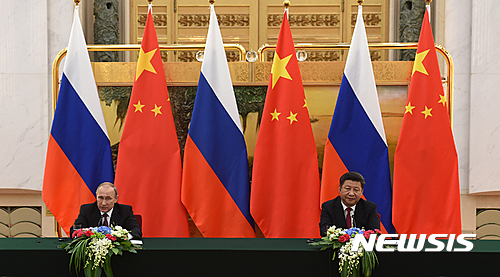
China, Russia to take counter-measures over THAAD deployment
China and Russia will take counter-measures against the deployment of the Terminal High Altitude Area Defense (THAAD) in South Korea, read an editorial published in the People’s Daily on August 4.
The decision of the US and South Korea to deploy THAAD will pose a threat to the strategic security of both China and Russia, added the commentary under the byline of Zhongsheng.
The following is the article’s translation:
It has been concluded that the decision between Seoul and Washington to deploy the THAAD system will impose unimaginable dangers on both the security of Northeast Asia and the world’s strategic stability.
As the Korean Peninsula is of vital importance to the security of Northeast Asia, China has reiterated on many occasions that in a bid to prevent a deterioration in the peninsula’s security, comprehensive and systematic solutions must be adopted to address both the symptoms and root causes.
Since a security pattern based on strategic skepticism or confrontation will never be sustained, the peninsula can only maintain its peace and stability when the peninsula is denuclearized, relevant countries normalize their ties and a peace and security mechanism is established in Northeast Asia.
However, the US and its allies are still obsessed with an outdated mentality to gain a physical and psychological edge by increasing their military presence. The deployment of THAAD is another risky action produced by such a mentality.
Their calculation this time severely threatens global strategic stability as the THAAD’s scope will go far beyond the Korean Peninsula and Northeast Asia.
Igor Coronation Te Qinke, editor of the Russian “National Defense” magazine, pointed out that the deployment of the THAAD system is just part of Washington’s global anti-missile scheme, adding that this decision mainly aims to contain the nuclear powers of China and Russia.
Counter-measures must be taken to fight such selfish and overbearing moves of pursuing absolute security at the cost of other countries, or the US and its allies would become aggravated and create even more trouble.
In a joint statement on global strategic stability signed by Chinese President Xi Jinping and his Russian counterpart Vladimir Putin in June, the two nations strongly opposed to the possible THAAD deployment that will severely infringe upon the strategic security interests of regional countries.
In addition, the THAAD deployment will only give rise to regional tensions rather than deter the threats from missile proliferation, which the South Korean government cited as a main reason for the THAAD deployment on its territory.
A few days ago, Chinese and Russian diplomats held another consultation on Northeast Asian security, reaffirming that under the comprehensive strategic partnership of coordination, China and Russia would further strengthen communication and coordination to protect each other’s interests, especially their strategic stability interests through the most reliable and effective ways.
As permanent members of the UN Security Council, China and Russia are also obliged to maintain world peace and stability. So the two countries are clear-cut and persistent in opposing the strengthened military presence in Northeast Asia by forces outside the region and the new missile defense system deployed by the US in South Korea.
As a next step, China and Russia may respond to the THAAD deployment with some unexpected counter-measures that the US and South Korea cannot afford, but these actions are aimed at protecting their own security interests and guard the global strategic balance and international relations.
China and Russia don’t want to see a Northeast Asia trapped in another Cold War or another arms race. However, a sound international relationship requires the efforts of all concerned sides.
If the US and South Korea are stiff-necked in the THAAD plan despite the warning from China and Russia, then they have to pay the price caused by their presumptuous deed.


